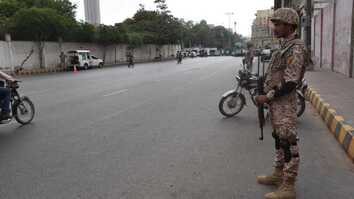KARACHI -- Authorities worldwide are cracking down on individuals and groups using social media to support the "Islamic State of Iraq and Syria" (ISIS) and other terrorist groups.
Some of those efforts include law enforcement agencies seizing computers and network servers as well as blocking internet portals used by the terrorist groups including ISIS.
Encouraged by global law enforcement agencies taking action against individuals promoting terrorism and recruiting youth for terror outfits, authorities in Pakistan and Afghanistan have been taking stringent measures.
Illustrating this are the cases of Saad Aziz and Naureen Leghari –- two students whom Pakistani authorities arrested after they became radicalised by ISIS propaganda.
Aziz, 27, joined a local extremist group, inspired by ISIS's social-media messaging, and confessed to being involved in a number of terrorist acts in Karachi.
A court this year sentenced him to 20 years in prison for trying to assassinate an American educator in Karachi in 2015.
Meanwhile, in April 2017, Leghari, then a second-year student at Liaquat University of Medical and Health Sciences (LUMS), a state-run medical school in the same district, was captured in a military raid on an ISIS cell in Lahore.
Leghari, who wanted to blow herself up at a Christian gathering on Easter in Lahore, had been recruited by ISIS through social media networks.
Authorities later freed her, saying that ISIS had deceived her.
In neighbouring Afghanistan, authorities in April broke up an ISIS social media group in Kabul, weakening the insurgents' propaganda capabilities.
Group members had 60 to 80 social media accounts. Their job was to promote ISIS, propagandise against the government, aggravate tribal differences and recruit youth and students for the militant organisation.
In this United States, Mediha Salkicevic, a Bosnian-born resident of Illinois in the United States, was sentenced to six and a half years in prison this past June for supporting terrorist insurgents in Syria. Salkicevic and her co-defendants used coded language on social media in their efforts to support ISIS-linked terrorists, said prosecutors.
Amer Sinan Alhaggagi, an ISIS supporter from California in the United States, was sentenced in February for identity theft and attempting to support the terror outfit. He was caught online saying he wanted to "redefine terror" by bombing gay nightclubs and college dorms and was sentenced to almost 16 years in prison for helping create social media accounts for individuals he believed also supported ISIS.
"Strict enforcement of cybercrime laws is absolutely necessary to overcome this massive challenge of online extremism," Afzal Naeem, a Karachi-based researcher who monitors social media trends, said in an interview.
"People, especially youth, around the world become attracted to extremist ideologies without even realising it and, in some cases, join the terror outfit," said Naeem.
Countering terrorist propaganda
In Pakistan, "measures against abuse of internet and social media for terrorism" comprise one of the 20 points of the country's National Action Plan, a counter-terrorism strategy the government adopted after Tehreek-e-Taliban Pakistan (TTP) killed more than 100 schoolchildren in December 2014 in Peshawar.
Since January 2015, Pakistan's Ministry of Information Technology has blocked more than 25,000 websites that terror groups including ISIS were operating.
In the past couple of years, law enforcement agencies, especially the Federal Investigation Agency (FIA), have seized several computer systems from militant hideouts in various parts of the country, Ahsan Ali, a senior Lahore-based security official, said in an interview.
In March 2018, the FIA arrested Imran, alias Saiful Islam, an ISIS social-media manager in Karachi. He is accused of luring youths to the militant outfit.
Imran is still in custody as the investigation proceeds.
"During the interrogation, it was learned that ISIS militants, including Imran, use lesser-known social media applications such as Telegram to recruit youths, especially women," said an FIA official, who requested anonymity because he is not authorised to speak to the media.
Last year, the National Counter Terrorism Authority (NACTA), a government body responsible for designing the country's counter-terrorism strategies, developed an online-reporting portal named Surfsafe aimed at countering online extremism.
Eyeing youth recruitment
The crackdown on terrorism supporters in Afghanistan and Pakistan coincides with ISIS's territorial defeat in Iraq and Syria earlier this year and as the group shifts its focus toward the two South Asian countries.
In Pakistan, ISIS -- in addition to recruiting from existing local militant groups -- has focused on recruiting university students and professionals. Through the use of social media, the terrorist group has sought new recruits to carry out attacks, fundraising and propaganda operations, analysts and government authorities say.
Tech companies are stepping up efforts to curb postings by extremist groups as the groups become increasingly tech-savvy.
Google and Facebook -- two of the most popular social media platforms -- have invested in programmes that aim to scan their platforms for activities of terror outfits, including ISIS.
Jigsaw, a technology incubator created by Google, in July 2017 launched a programme called the Redirect Method that uses AdWords and YouTube videos to target children at risk of radicalisation.
Similarly, Facebook says it used a combination of artificial intelligence and machine learning to remove more than 3 million pieces of ISIS and al-Qaeda propaganda in the third quarter of 2018.

![Screenshot from an ISIS video released earlier this year showing a supporter engaging in 'digital jihad'. [File]](/cnmi_pf/images/2019/08/28/19674-isissupporter-585_329.jpg)






